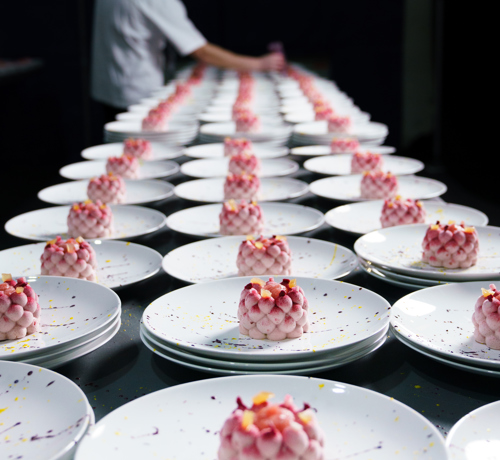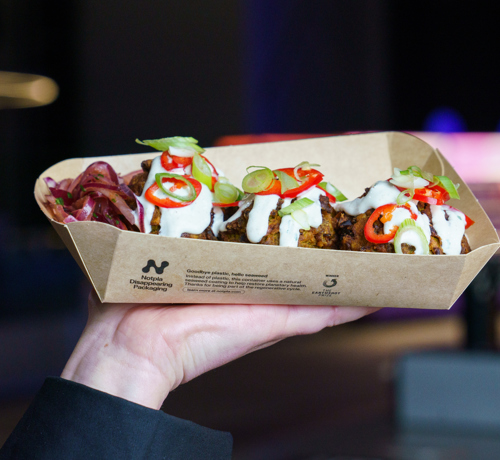This Stop Food Waste Day, we’re highlighting Sustainability in Food & Drink from Payne & Gunter (powered by Levy) for The BRIT Awards 2025.
Music booms around The O2, spotlights dazzling the stage as a final technical rehearsal for the 2025 BRIT Awards gets underway. It is loud. Very loud. Very showbiz.
Easy to get distracted.
Not Payne & Gunter’s catering sustainability team. Matt Fulford – consultant to Levy brand Payne & Gunter’s sustainability work at The BRIT Awards since 2019 - is laser focused on making sure the food waste buckets are in place.
“There!” Matt points out a stack, inconspicuously tucked into a corner in the main arena service area backstage, as he explains how they are just one of the keys to making the food and drink at The BRIT Awards as sustainable as possible.
The eyes of the sustainability team will be trained on these receptacles on awards night, ensuring that serving staff scrape nothing but food waste from the plates collected from guests’ tables on the Arena Floor and Suites.
Cutlery, Champagne corks, tubes of discarded lip gloss? None of that can slip in by mistake. Because that would contaminate the waste and stop it being able to be sent to the onsite state-of-the-art aerobic biodigestor eco-digester, which helps reduce Greenhouse Gas Emissions.
“I don’t think we would claim to be zero waste quite yet, but I’d say we’re pretty close,” Matt says, as he outlines the challenge of making the awards arguably one of the most sustainable around.
“The reality is you are dealing with an incredibly high-profile, high-pressure event, which must be delivered perfectly, but we still needed to find ways to reduce the impact of food waste and reduce the amount of plastics and unrecyclable waste materials being used.”
Levy brand, Payne & Gunter has been looking after the hospitality operations at the awards for the past 21 years, serving up legendary experiences to the great and the good of the music industry.
They have also led the charge to improve sustainability across food, drink and front of house event operations at the awards, rolling out many Levy-conceived sustainability initiatives over the past six years.
Reducing food waste, which plays a vital role in reducing Greenhouse Gas Emissions and is a key part of Levy sustainability strategy - is just the start.
‘Reduced Carbon Main Course’
British, seasonal, plant-forward dishes, locally sourced and regeneratively produced ingredients are everywhere on menus; starters and desserts are vegan.
This year, sustainably-sourced kelp featured on the starters from Câr-y-Môr - Wales first community owned regenerative seaweed farm, which uses zero input farming methods to improve the coastal environment.
Bread rolls, meanwhile, were made with flour from British regenerative food and farming business Wildfarmed– which, from 2025, is Levy’s flour of choice across the business.
Local London honey and seasonal rhubarb featured on the desserts. All dishes are labelled with their carbon impact and the arena menu included a specially signposted “Reduced Carbon Main Course” (Laverbread leek Wellington with plant-based cheese arancini) alongside a main course of Venison.
Venison is also a great sustainable choice: a ‘lean and clean’ red meat that’s brilliant for biodiversity, has significantly lower carbon impact than beef and is nutritionally rich and packed with antioxidents.
The meat came from three starred Michelin Chef, Brett Graham (The Ledbury) – whose estate deer are raised using a low input farming model with no medication, concentrates or imported feed.
“One of the main challenges with championing seasonal product is the time of year The BRITs takes place, comments Lucy Fulford, Operations Manager at Payne & Gunter. The awards which come right at the end of the winter mean “we are looking at introducing more pickling and preserving,” she says.

Wine in Cans and Cardboard
The Sustainability focus continues into the drinks offering.
Wine from English wine brand, Uncommon, comes in cans with “a carbon footprint 86% lower than glass bottles”.
Wines from Anglo-Italian wine brand, ‘When in Rome’ are also on the list coming in bottles made from 94% recycled paperboard around a food-grade pouch, a more sustainable alternative to traditional glass.
Other wine at the awards included Amandla, a black and female wine company that say they are “changing the game” championing freedom, power and resilience within women and inspiring future generations.
The list of sustainability interventions goes on. Staff drinking water, previously provided in plastic bottles, now comes in infinitely recyclable Life Water aluminium cans. OneCup reusable and sustainable cups (now standard use at The O2 and first trialled at The BRITs) are used for guests’ drinks, eliminating the need for single use plastic.
Crockery and cutlery, which used to come onto site wrapped in plastic is now delivered in boxes with thin layers of cardboard to protect over it instead or packed into reusable tubs. This has led to a halo effect with suppliers now using this as a standard.
Even the bags in which some guests collect their pre-ordered drinks have also undergone some sustainability magic.
Once plastic, the bags are now paper, and excess production has been avoided by not printing the specific date alongside the BRITs logo.
“It means we can use any left over for next year,” Matt smiles, “less waste”.
Reducing Plastic. Improving Recyclable Solutions
Sustainable packaging solutions are also to be found in the retail section of hospitality, where Levy to-go food is served in Earthshot prize winner, Notpla’s seaweed-based packaging. Life cycle analysis shows this to be an impressive 39 %potential CO2e reduction over the conventional packaging previously used and is another example of a project first used at the BRITs and now standard use at The O2.

Continuous Improvement
With an aim to reduce carbon impact ever more each year, sometimes continuous improvement may become counterintuitive.
“One year we realised we were getting quite a lot of butter back,” recalls Matt. The next year, individually portioned butter was put out – an experiment so the Sustainability Team could see exactly how much was unused. It proved that half was not being eaten, and portions were adjusted to halve the quantity. “We’ve not only reduced the food impact, we’ve also reduced the waste impact too.”
The same goes for printing the BRIT Awards programmes provided to guests on the night. “We found we were gathering up loads at the end of the night,” says Matt, noting that the brochure is also available in digital form.
Closer analysis of the actual numbers enabled the team to reduce the print run. So, the impact of printing them has now been halved and they are now also printed on recycled paper.
Any leftover brochures left around the Arena are taken to the After Show Party by the Sustainability Team so that guests can take them as a souvenir and avoid any going to waste.
“What I’m most proud of is that we have taken the initiative, we haven’t waited for somebody to tell us what to do,” says Bethan James, Payne & Gunter Managing Director.
"We have already changed our practices so that Julie’s Bicycle (sustainability consultants with a long-standing partnership with The BRIT Awards to support their sustainability efforts across the awards including in hospitality) say things like ‘you’re already doing so much good work already on the sustainability front.”
The BRITs recognise this too. Maggie Crowe OBE, Director of Events & Charities, BRIT Awards Ltd said: “Our partnership with Payne & Gunter now extends 21 years. The passion and integrity Levy demonstrates when it comes to food sustainability around The BRITs is extraordinary.”
“We listen and learn, and importantly, we act on the findings of the impact report each year. Matt is our BRITs warrior, whose experience in this area is second to none. The whole team should feel really proud as we consciously make this a priority across all our delivery.”
So, is there more to be done to improve sustainability here? “There will always be something," smiles Matt.
“We’ve done a lot, but we’re always looking for the next thing or innovation to make that extra bit of progress."
There are plans to continue to work with chefs to further reduce the carbon footprint of the food served, move into making an impact in hospitality areas P&G look after which are outside the area, as well as put more effort into communicating, successes more effectively to raise awareness of the work Payne & Gunter – powered by Levy – is doing.
And then he is gone. Back to check on the food waste buckets.











